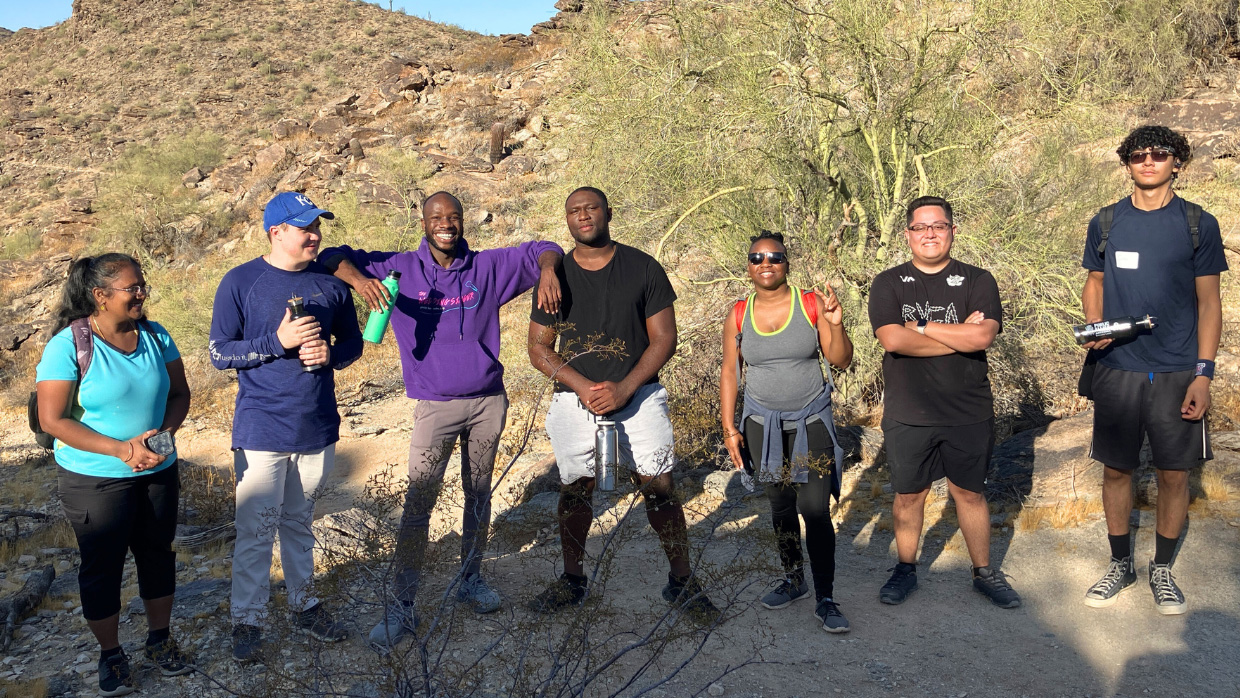
Public Allies Arizona empowers a new generation of leaders with its 2023-24 cohort
October 31, 2023 — This year, Public Allies Arizona added 16 more to its list of over 500 participants since the program's inception nearly two decades ago. The newest Public Allies Arizona cohort began its 2023-24 program year in October, giving participants the opportunity to work with organizational partners in Greater Phoenix and Tucson, including Tucson Parks and Recreation, Common Sense Media, Arizona Commission on the Arts and more.
Public Allies Arizona (PAAZ) is an AmeriCorps program of Arizona State University’s Lodestar Center for Philanthropy and Nonprofit Innovation that places its members in paid internships with community partner organizations throughout Maricopa and Pima county communities. It aims to provide career development to new changemakers, push innovative solutions to local issues, and create a new generation of leaders.
Applicants for the program are screened through an online application and a series of interviews, which scout for “emerging leaders who are passionate to make a change in their community, and are looking to be challenged and to grow,” according to the PAAZ website. Those selected begin the program with a six-week training program that fosters a greater understanding of both the program itself and their fellow Allies before going on to work with the Partner Organization matched with their interests.
Previous Public Allies members have gone on to find great success in the nonprofit sector and beyond through their well-established passion for community service. This year’s cohort is no different, with each representing an innate desire to support their communities and solve local issues.

“I am looking forward to potentially having an actual positive impact on the lives of people,” wrote new Public Ally William Renfroe, who is placed with ICAN: Positive Programs for Youth. “It is important to serve my community, because I know it is impossible to get through life completely on your own. We are all subject to the environments we are born into and I feel I have a duty to help, not hinder or standby while people are being hindered by things outside of their direct control.”
Similarly, many of the new cohort members stressed the value of amplifying inclusive excellence through service. For example, Public Ally Zachary Owens, who is placed with Tucson Parks and Recreation, voiced this ideal, writing about his goal of “developing a Team Service project that will better my community and allow silenced voices in Tucson to be heard.”
By channeling this commitment to community service and dedication to learning, PAAZ participants are able to achieve real, sustainable change in their communities.
However, beyond acting as a learning and community service opportunity, the PAAZ program also provides a valuable career stepping stone for its participants. Ally Gabriel Mendoza cites this as his greatest expectation for how he will grow through the program by interning with United Way.
“I expect to have to have the skills necessary to lead a group of volunteers or partners towards a collective goal,” Mendoza wrote. He is hoping to gain the ability to “reach boards of directors, potential coworkers, and the public.”
For this reason, the Public Allies Arizona program can also be a route for those looking to transition between education and the workforce. The program provides Allies with a stipend during the 10-month period as well as an AmeriCorps Education Award afterward, providing ample opportunity for participants to continue their educational and professional development while maintaining their dedication to service.
Many participants in the new program year are currently in the midst of this change. For example, Public Ally William Knapp is eager to complete this transition while working with Ridgeline Academy.
“I hope to learn more leadership skills and get used to being part of the workforce,” Knapp wrote.

While Allies themselves benefit greatly from participating, Partner Organizations also see equal gains from the internship program. By hosting a talented, emerging community leader, organizations are able to overcome the limitations of their own staff and resources. This expanded organizational capacity can lead to even greater community impact.
No matter their personal goals, each member of the newest Public Allies cohort will doubtlessly affect positive change in their community. Whether it is building community frameworks or helping those in need, we look forward to seeing all that they will achieve in the upcoming months.
Meet this year's Allies here.
Story by Lillian Finley, ASU Lodestar Center.
Interested in hosting an Ally?
Do you have a project that you would love to implement, but lack the staff capacity or other resources? We help our partners increase their capacity to achieve their mission by matching them with talented individuals from the community. Learn about hosting an Ally.
- Raine McAngus: A beacon of leadership and change in youth advocacy and healthcare access
- In the news: Alums help kids in need through Child Crisis Arizona